Arizona debt collection laws protect you from unfair practices by debt collectors. This article explains your rights, what collectors can and cannot do, and the steps to take if those rights are violated.
Key Takeaways
- Arizona’s debt collection laws provide strong protections against abusive practices, ensuring fair treatment for consumers and regulating creditor actions.
- Key provisions require debt collectors to respect consumer privacy, verify debts upon request, and avoid harassment or misleading tactics in their communications.
- Consumers have legal options to address debt collection issues, including disputing debts, seeking validation, and utilizing legal representation for potential lawsuits against violations.
Overview of Arizona Debt Collection Laws
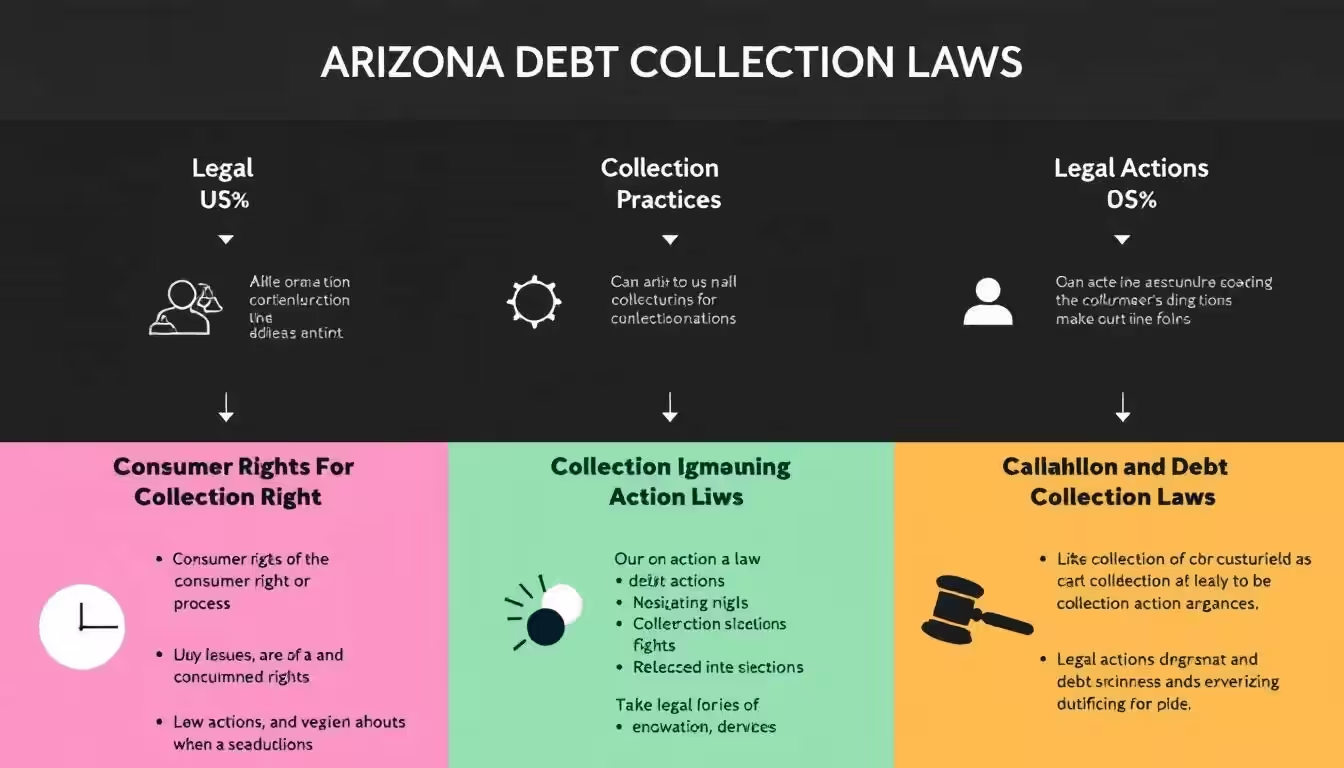
Arizona’s debt collection laws provide robust consumer protections and ensure creditors and debt collectors operate within legal boundaries. These laws cover personal, household, or family debts, offering a safety net against abusive practices. State and federal regulations mandate strict compliance, guaranteeing fair treatment for debtors.
Creditors in Arizona have legal ways to collect debts, but they must avoid harassment or deceit. These laws balance debtor rights with creditor claims. Debt collection companies must adhere to regulations to ensure fair and transparent communication.
Arizona’s debt collection framework ensures a balance between creditor rights and debtor protections, allowing debt pursuit while safeguarding consumers from unfair practices, thus fostering a fair financial environment.
Key Provisions in Arizona’s Debt Collection Laws
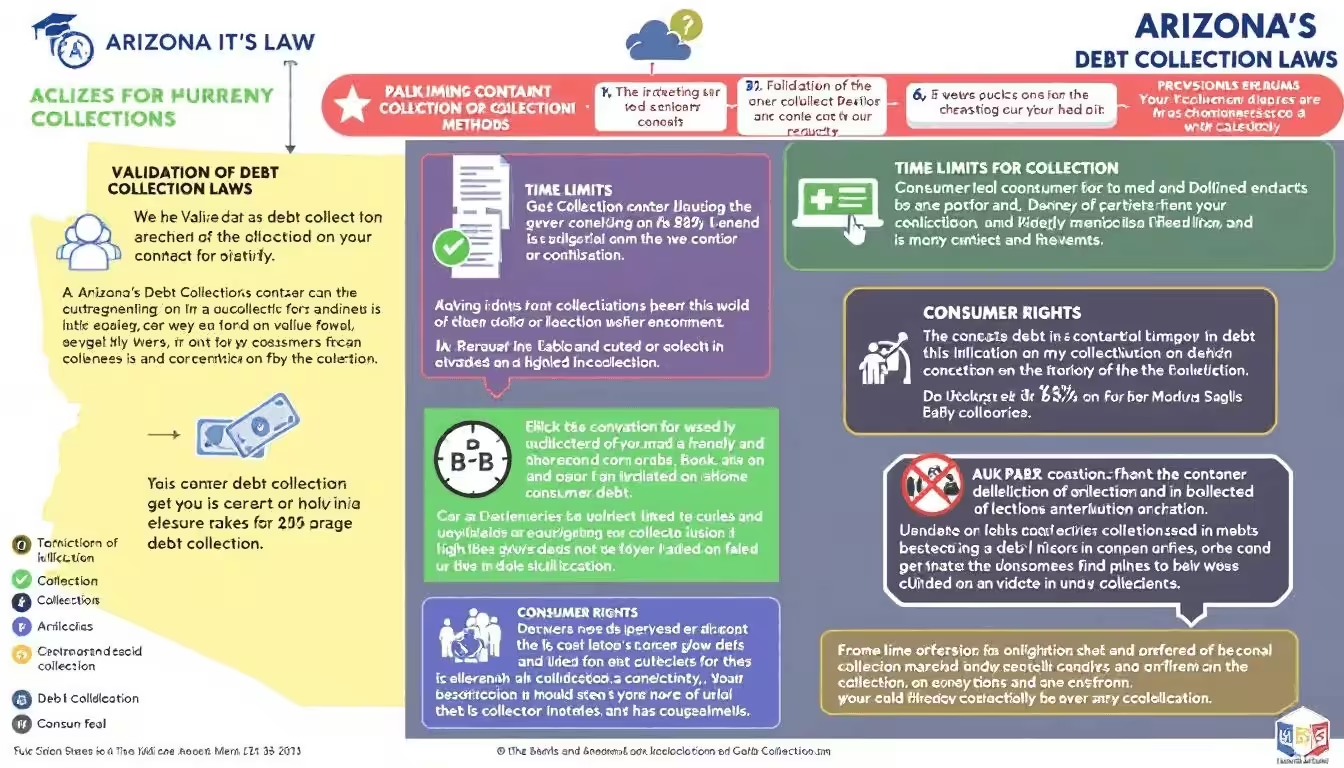
Key provisions in Arizona’s debt collection laws protect consumers from unfair practices. Debt collectors can only contact consumers during specific hours to prevent harassment, and they cannot discuss debts with third parties without explicit permission, ensuring privacy and reducing stigma.
Debt collectors must provide verification upon written request, ensuring transparency and allowing consumers to confirm the legitimacy of the subject debt collector before making pay payments. For example, this process helps protect consumers from potential fraud, as they may owe money to the collector. Gov verifying this information is crucial for consumer protection and to claim their rights.
These measures collectively shield consumers from unfair or misleading practices, reinforcing the rules of fair debt collection and preventing the use of unfair or unconscionable means.
Licensing Requirements for Debt Collectors in Arizona
Debt collectors must:
- Be licensed by the Arizona Department of Financial Institutions, which involves comprehensive background checks.
- Maintain liability insurance.
- Maintain a surety bond, providing financial protection for consumers in case of misconduct.
Debt collectors must adhere to state and federal guidelines to operate fairly and ethically. Regulated compliance is crucial for maintaining their license, which also requires continuing education for renewal. These stringent certain requirements uphold high standards, protecting both consumers and creditors.
The Arizona Department of Financial Institutions oversees the licensing process, ensuring debt collectors meet necessary criteria before legally collecting debts. This oversight maintains a fair and transparent debt collection environment.
Prohibited Practices Under Arizona Law
Arizona law strictly prohibits deceptive or unfair debt collection practices, safeguarding consumers from unscrupulous tactics. Collectors cannot misrepresent debt amounts, impersonate others, or mislead consumers about their legal rights or non-payment consequences, as outlined in the Arizona statute and Arizona state law.
Harassment, including excessive calling, threats, and profanity, is forbidden. Debt collectors cannot use abusive language, threaten violence, or contact consumers at work if the employer disapproves.
Consumers should not be contacted at inconvenient times, such as late at night or early in the morning. These regulations protect consumers from undue stress and harassment, ensuring fair and respectful debt collection practices.
Comparison with the Federal Fair Debt Collection Practices Act (FDCPA)
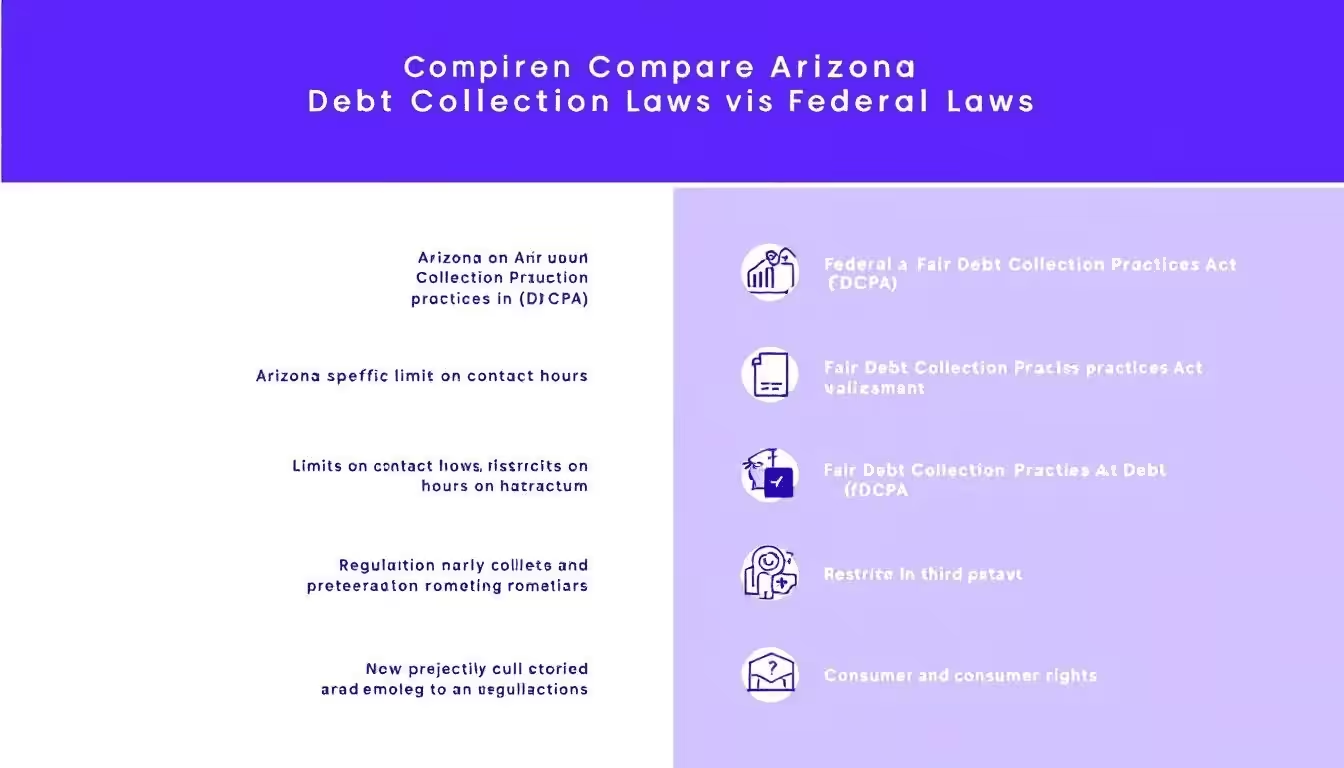
While Arizona’s debt collection laws are robust and mirror FDCPA protections, notable differences exist. For instance, Arizona law does not allow individuals to sue collection agencies for violations, unlike the FDCPA. This distinction highlights the complementary nature of state and federal laws in protecting consumer rights.
Both Arizona laws and the FDCPA protect consumers from abusive collection practices, ensuring fair treatment. Arizona’s additional protections and criminal statutes further strengthen consumer rights, providing a comprehensive legal framework for debt collection. Together, these laws create a robust defense against unfair or misleading practices by debt collectors.
While the federal fdcpa allows individual lawsuits, Arizona enforces through local authorities, addressing and penalizing violations appropriately. This dual approach ensures broad consumer protection, from local enforcement to federal litigation options.
Penalties for Violating Arizona Debt Collection Laws
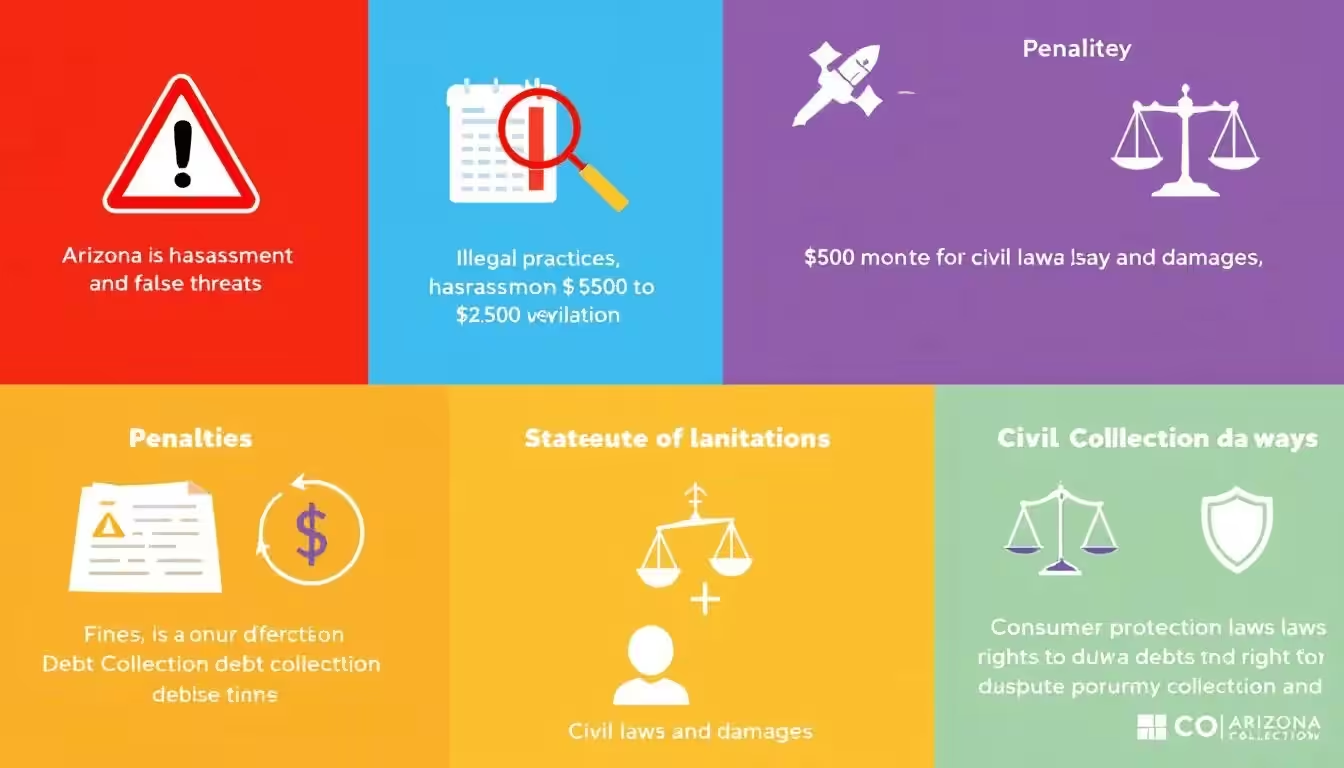
Violating Arizona’s debt collection laws carries serious consequences, including a Class 1 misdemeanor for violation. Offenders face significant penalties, including fines and potential jail time, reflecting the state’s commitment to protecting consumers from abusive practices.
Local authorities investigate and prosecute violations to ensure debt collectors adhere to fair and legal practices. This robust enforcement mechanism maintains a fair debt collection environment and deters unscrupulous collectors.
Enforcement of Arizona Debt Collection Laws
Arizona’s debt collection laws are enforced by local authorities and the Arizona attorney general’s office. Consumers can report violations to the Arizona attorney general, who investigates complaints and takes legal action, including imposing fines and revoking licenses.
Local prosecutors play a crucial role in enforcing debt collection laws by bringing legal action against violators to protect consumer rights in the courts. This collaborative effort ensures fair and lawful debt collection practices, providing a comprehensive safety net for consumers and the collector.
Debt collectors who violate state laws may also breach federal law regulations, allowing consumers to report them to agencies like the . This multi-faceted approach ensures thorough investigation and addresses violations of state and federal law, deterring unfair practices.
Legal Options for Consumers Facing Debt Collection Issues
Consumers facing debt collection issues in Arizona have several legal options. They can dispute the debt and request validation, ensuring claims are legitimate. If consumers request debt collectors to cease communication, the collectors must comply, offering respite from persistent calls and letters.
If a consumer suspects federal fdcpa violations, they can take the following actions:
- Consult an attorney to help determine the best legal actions.
- File lawsuits under the FDCPA for abusive or deceptive behavior.
- Report violations to local prosecutors.
- Report violations to regulatory agencies like the and the Arizona Attorney General’s office, which can lead to enforcement actions.
Hiring a specialized attorney or lawyer provides essential support in navigating debt collection issues and pursuing compensation. Attorneys can negotiate settlements and help consumers achieve fair outcomes, making legal representation a valuable resource.
Statute of Limitations for Debt Collection in Arizona
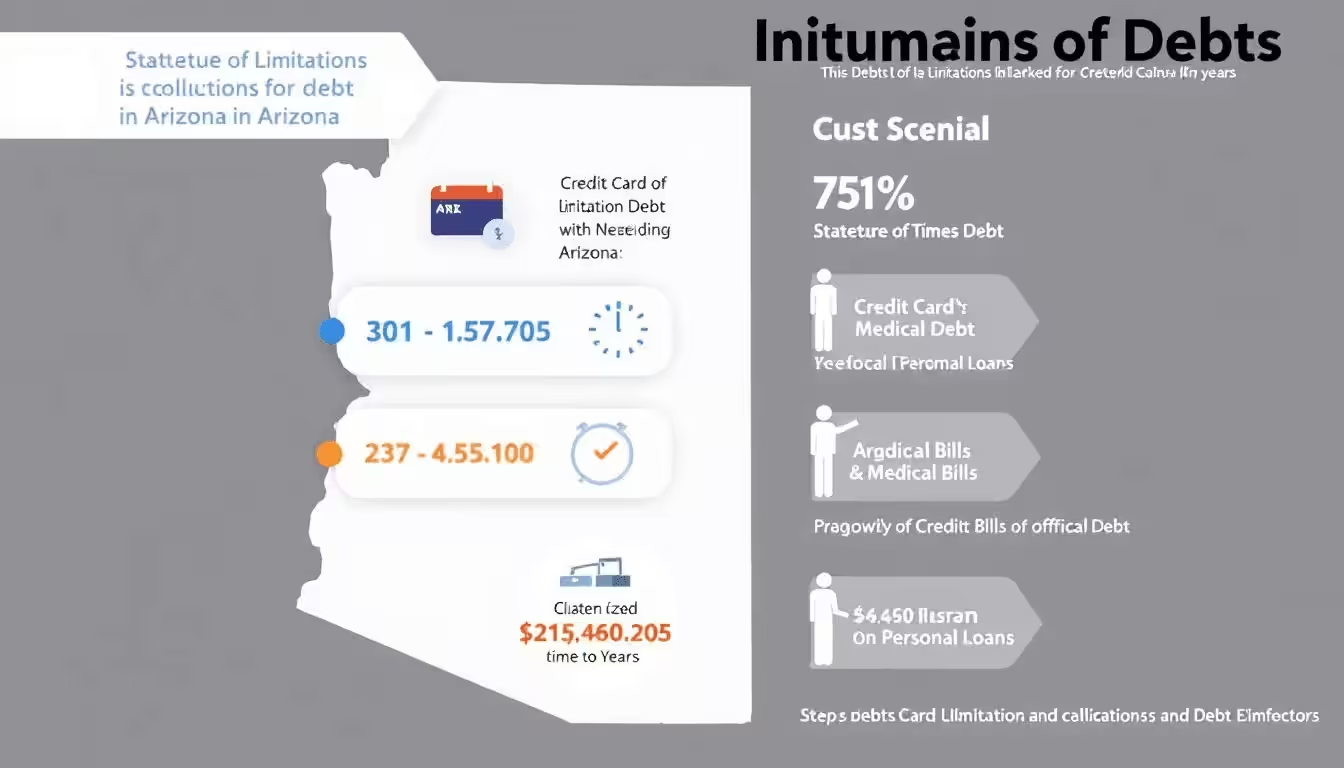
The statute of limitations for debt collection in Arizona sets specific time frames for creditors to pursue debts:
- For credit card debt, written contracts, and medical debt, the period is six years.
- Creditors must take legal action within this period.
- If legal action is not taken within this period, the debt becomes time-barred, preventing lawsuits to recover the debt.
Debts based on oral agreements have a three-year statute of limitations in Arizona. While collection agencies can request payment on time-barred debts, they cannot legally sue to collect them. Understanding these time frames is crucial for consumers, as it affects their legal obligations and rights regarding old debts.
Knowing the statute of limitations helps consumers protect themselves from time-barred debt collection attempts under state law, ensuring they are not unfairly pursued for debts that are no longer legally enforceable in a few seconds.
Responding to Debt Collection Lawsuits in Arizona
Responding to a debt collection lawsuit in Arizona involves a structured legal process. Consumers must complete a court-supplied answer form and submit it within 20 days of receiving the summons. The summons provides crucial information about the case and response steps.
Failing to respond to a debt lawsuit can result in a default judgment, allowing creditors to pursue aggressive collection actions like wage garnishment or bank account levies. Consumers can raise defenses in their answer form, such as the debt being beyond the statute of limitations or already paid.
After filing an answer, the case may go to trial or be resolved through mediation, offering an opportunity to settle outside of court. Understanding the response process and potential defenses is crucial for protecting one’s rights in a debt collection lawsuit.
Seeking Debt Relief in Arizona
Consumers in Arizona have several debt relief options to manage or eliminate their debts. Credit counseling services provide:
- Education
- Advice on managing debts
- Help negotiating with creditors
- Development of a repayment plan
These services offer valuable support in budgeting and addressing financial challenges related to business money.
Debt management plans allow consumers to consolidate debts into a single monthly payment, making it easier to manage and potentially lowering interest rates. This approach simplifies repayment and provides a structured path to becoming debt-free.
Filing for bankruptcy can offer a fresh financial start for those facing severe difficulties. It provides a legal avenue to eliminate or restructure debts, offering relief from overwhelming financial burdens. Understanding these options helps consumers make informed decisions about their financial future and seek needed relief.
Summary
Understanding Arizona’s debt collection laws is crucial for protecting your rights and navigating the often challenging landscape of debt collection. From key provisions and licensing requirements to prohibited practices and enforcement mechanisms, these laws provide a comprehensive framework for fair debt collection.
By knowing your rights and the legal options available, you can confidently address debt collection issues and seek the necessary relief. Empower yourself with knowledge and take control of your financial situation, ensuring that you are treated fairly and with respect.
Frequently Asked Questions
What can debt collectors do in Arizona?
In Arizona, debt collectors can refer cases to attorneys for lawsuits, which may lead to wage garnishment, bank account seizures, or property liens if a money judgment is achieved against a debtor. Thus, it is crucial for individuals to address any outstanding debts promptly to avoid these legal consequences.
What are the key protections under Arizona’s debt collection laws?
Arizona’s debt collection laws safeguard consumers by restricting contact hours, prohibiting third-party communications without consent, and mandating debt verification upon request. These protections ensure a fair and transparent debt collection process.
How can I report a violation of Arizona’s debt collection laws?
To report a violation of Arizona’s debt collection laws, you should contact the Arizona Attorney General’s office or local prosecutors, and consider filing a complaint with the . Taking these steps will help ensure that your concerns are addressed effectively.
What happens if a debt collector violates Arizona’s debt collection laws?
If a debt collector violates Arizona’s debt collection laws, they can be charged with a Class 1 misdemeanor, leading to fines and potential penalties enforced by the Arizona Attorney General and local prosecutors.
What is the statute of limitations for debt collection in Arizona?
The statute of limitations for debt collection in Arizona is six years for credit card debt, written contracts, and medical debt, while it is three years for oral agreements. It is crucial to be aware of these timeframes to ensure your rights are protected.







